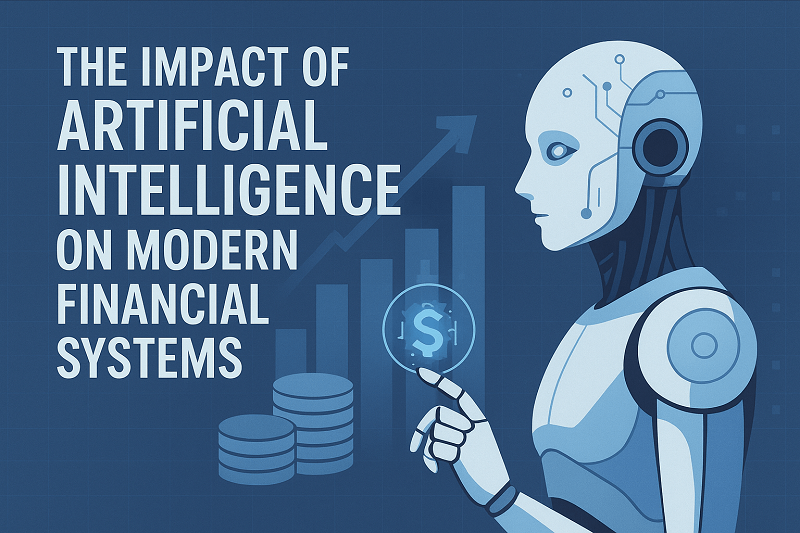The global economy has always been influenced by waves of innovation, but few developments rival the scale of change brought by artificial intelligence (AI). The integration of AI into banking, trading, payments, and investment decision-making has reshaped financial structures at both institutional and consumer levels. Understanding the impact of AI in Financial System dynamics requires examining its role in efficiency, risk management, customer experience, and regulatory frameworks. AI is not only transforming traditional methods but is also laying the foundation for a modern financial system with AI that operates faster, smarter, and more securely than ever before.
Redefining Efficiency in Financial Operations
Banking institutions have traditionally used manual labor and old systems that would slow down banking processes. In the current world, AI has affected Financial System activities through automation of previously human-dealing tasks. AI-enabled algorithms trade in milliseconds, chatbots respond round the clock to customers, and billions of transactions are checked immediately by fraud detection systems.
When it comes to introducing AI and the development of the modern financial system, banks are substituting the old systems with smart systems that simplify the work of the back office. These services decrease the number of mistakes during transactions, minimize expenses and enhance productivity. To give an example, machines can be used to process unstructured financial data using natural language processing and predictive analytics can be used to manage risks proactively. The efficiency at this level was not imaginable ten years ago.
The growing attention towards sustainability and rapidity has contributed to the development of the modern AI-driven financial system where judgement is made based on the real-time information and not on the reactive steps. This change allows institutions to react swiftly to the economic shocks and cybersecurity threats as well as market volatility. If you’re struggling with complex topics, many students search for professional help by typing write my finance essay to get expert guidance and support
Improving Fraud Detection and Risk Management.
One of the most crucial areas influenced by the impact of AI in financial system is risk assessment. Conventional scoring of credit involved the use of stagnant data such as income or the history of employment. However, AI uses a wider range of data of behavior and transaction to create dynamic risk profiles. This enables the lenders to make better judgments on who is eligible to borrow or receive credit.
The combination of AI and the current frameworks of the financial system can be applied to fraud prevention. Financial crimes are becoming sophisticated with the rising digital transactions. Pattern recognition and anomaly detection are AI-based systems of surveillance that indicate suspicious behavior in real-time. The AI tools are adaptable and learn unlike the older systems that would easily result in false alarms, which would decrease errors but lose customer confidence.
The emergence of a modern financial system with AI also ensures resilience in global markets. Through the analysis of millions of scenarios, AI will make portfolios more diversified and immune to disastrous losses. Its applications in financial ecosystem protection are insurance underwriting to market simulations.
Radicalizing Customer Experience.
The role of AI in the Financial System may be best seen beyond the institution as it can be witnessed in the daily interaction between the common customer and the financial institution or a platform. Robo-advisors and virtual assistants offer personalized financial guidance to help individuals budget, invest, and plan for retirement. AI personalizes itself based on the analysis of spending behavior, the flow of income, and objectives in life.
The advancement of AI and modern financial system customer engagement means no longer waiting in long lines or relying on human brokers. Digital wallets, credit management tools that operate based on AI and biometric security functions empower users to be convenient and confident. This individualized experience leads to loyalty and increased financial literacy particularly amongst the younger generations.
As the demand for accessibility grows, the modern financial system with AI ensures that even underbanked populations gain access to financial services. AI-based micro-lending applications will also determine credit-worthiness based on alternative data sources like phone usage or payment history, where conventional banks might have refused to provide services.
Regulation and Ethical Usage Problems.
The effects of AI in the Financial System innovations are mostly positive but there are challenges. The regulators have to face the transparency of machine learning models which is commonly denounced as a black box. Financial institutions should make sure that AI decisions are not biased and discriminatory, especially with regard to lending and hiring.
The creation of AI and financial system regulation systems need an equilibrium between innovation and regulation. This balance is critical in creating trust among people and averting systemic risks. Another issue is that of data privacy; as AI will be gathering enormous volumes of personal data, the regulators have to introduce very stringent regulations to safeguard the consumer interests. Many students under tight deadlines look for reliable services where they can buy accounting homework to save time and ensure accuracy
The Future of AI in Finance
In the future, the influence of AI on the Financial System is bound to grow with the advent of quantum computing, blockchain implementation, and decentralized finance (DeFi). AI will not only be processing transactions but will predict financial changes happening globally, will provide insights into the perspective of the markets, inflation, and consumer behavior.
Human-machine collaboration will play a pivotal role in the development of AI and the new applications of AI in the financial system. Algorithms are fast and precise but human judgment is a guarantee of ethical value and context interpretation. The future of the financial sector will be characterized by hybrid decision-making.
Finally, the vision of a modern financial system with AI is the increased inclusivity, efficacy, and safety of financial services. The organizations that will adopt this future, as they strive to solve ethical issues, will usher the world economy in the next stage of development.
Conclusion
The rapid adoption of artificial intelligence demonstrates that finance is not just reacting to technological trends but actively being reshaped by them. The impact of AI in Financial System spans from operational efficiency to customer interaction, proving that the technology is a core driver of modern economics. Through the integration of AI and modern financial system processes, institutions are discovering new ways to predict risks, personalize services, and reduce inefficiencies. The resulting modern financial system with AI is one that promises to democratize access, secure transactions, and maintain resilience in the face of global challenges.
As AI continues to evolve, so too will the financial systems that depend on it, ensuring that the synergy between human expertise and technological innovation defines the future of global finance.





